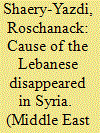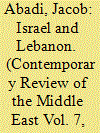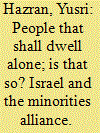|
|
|
Sort Order |
|
|
|
Items / Page
|
|
|
|
|
|
|
| Srl | Item |
| 1 |
ID:
172364


|
|
|
|
|
| Summary/Abstract |
In 1989 SOLIDE, a grass root movement from within the right wing Christian opposition to the Syrian military security emerged in order to campaign for the recovery of the disappeared. Drawing on oral history, interviews, fieldwork at SOLIDE's protest tent in downtown Beirut, and documentary analysis, I trace the genealogy and politics of SOLIDE's activism from the late 1980s to the present, showing that SOLIDE's activism underwent profound changes in response to Lebanese political developments. Beginning as an avowedly political campaign, in the aftermath of the war it turned into a human rights-focused NGO, a shift that was only possible because of an alliance with a group of the mothers of the disappeared; gender stereotyping enabled SOLIDE to present itself as fundamentally apolitical. With the establishment of a protest tent in downtown Beirut in 2005, in the period after the Syrian withdrawal until the end of its sit-in in 2015, SOLIDE took on the characteristics of a social movement. Analysis of the various phases of activism demonstrates that in Lebanon the boundaries between humanitarianism, often of religious inspiration, and human rights activism, supposedly secular, are porous, as too the boundary between party-political activism and civil society.
|
|
|
|
|
|
|
|
|
|
|
|
|
|
|
|
| 2 |
ID:
174369


|
|
|
|
|
| Summary/Abstract |
This article provides an analysis of the course of Israeli-Lebanese relations and its purpose is to shed light on the contacts between the Maronites in Lebanon and the State of Israel. It argues that the primary reason for the Maronites’ willingness to cooperate with the Jews was the fear that the rising tide of Arab nationalism in Lebanon would have adverse effects on their survival as a religious minority. Moreover, it demonstrates that these contacts laid the background for cooperation between the two communities which survived the vicissitudes of the Lebanese civil wars and still plays a role in Israeli foreign policy.
|
|
|
|
|
|
|
|
|
|
|
|
|
|
|
|
| 3 |
ID:
174160


|
|
|
|
|
| Summary/Abstract |
The state of Israel, and the Zionist movement before it, has always considered itself to be facing an existential threat from hostile surroundings. Hence, seeking alliance with non-Arab nations and ethnic minority groups in the area was seen as a means of confronting this challenge. During the early decades of its existence, the Israeli establishment adopted the concept of the alliance of the periphery and the alliance of minorities developed by Israel’s first prime minister, David Ben-Gurion and his protégée, Reuven Shiloah, the founder of the Israeli intelligence service, the Mossad. This research project will demonstrate that, in opposition to apologetic and ideologically-motivated arguments that deny that alliance with minority communities has been a systematic policy, the minorities’ alliance has for decades been an important foundation of Israeli strategy vis-à-vis the Arab world. Furthermore, the article will argue and demonstrate that the ‘Minorities Alliance’ is derived from ideological, historical, and strategic considerations anchored in the very existence of Zionism and Israel. Furthermore, and on the same note, this conception and strategy cannot be disconnected from the self-perception of Zionism, its self-directed reading of Jewish history, and the Zionisation of the milieu.
|
|
|
|
|
|
|
|
|
|
|
|
|
|
|
|
|
|
|
|
|